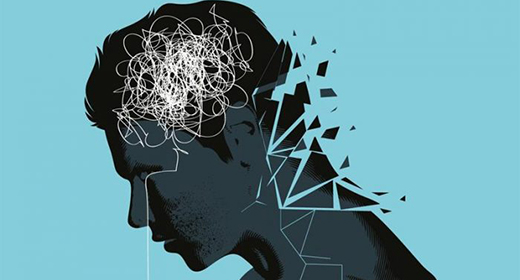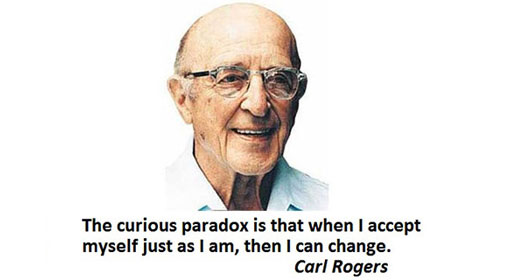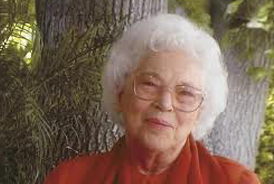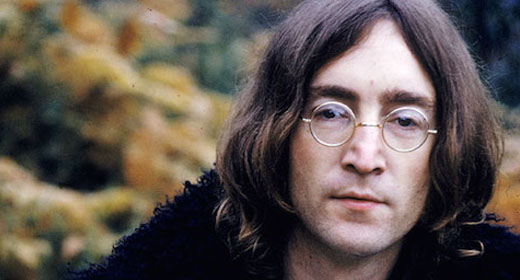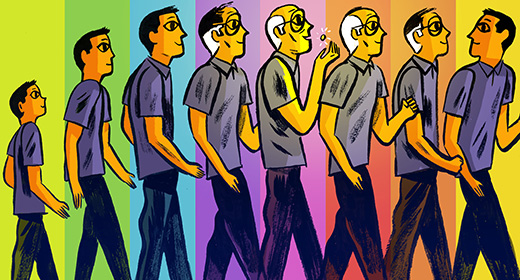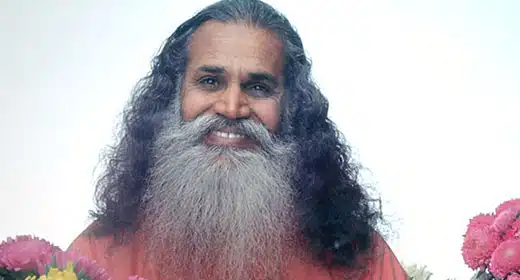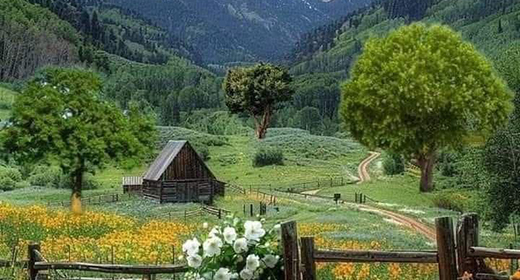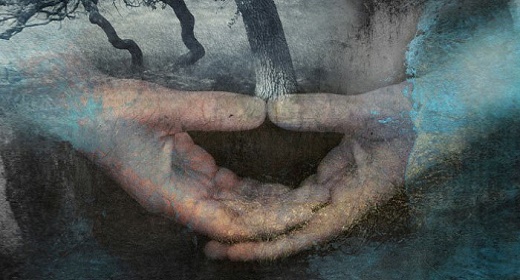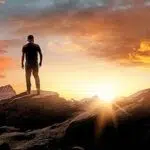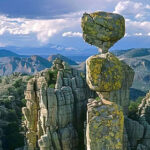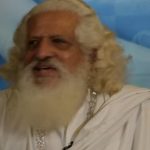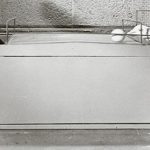Ram Dass: by Edie Weinstein-Moser: What an honor it was to speak with a man for the second time in thirteen years whose very presence elicits a sense of tranquility that surpasses this writer’s ability to express in words.  The beloved author of pioneering works that exemplify spiritual exploration for the past four decades, such as “Be Here Now”, “Grist For The Mill” and “How Can I Help?” is still going strong, surviving a stroke five years back and bouncing back beautifully. I recall that when this occurred, prayers were called forth worldwide. He attributes much of his healing to that incomparable force. His warmth and sense of humor were not damaged one bit and perhaps are a symbol of his resilience.
The beloved author of pioneering works that exemplify spiritual exploration for the past four decades, such as “Be Here Now”, “Grist For The Mill” and “How Can I Help?” is still going strong, surviving a stroke five years back and bouncing back beautifully. I recall that when this occurred, prayers were called forth worldwide. He attributes much of his healing to that incomparable force. His warmth and sense of humor were not damaged one bit and perhaps are a symbol of his resilience.
New Visions Magazine: You have been woven like a thread into the last thirteen years of my life, from your role as ‘yenta’ (matchmaker) when Michael and I met at a lecture you gave in Philadelphia in 1986 to the appearance on my seminary reading list of the book you co-wrote with Paul Gorman: “How Can I Help?” I have a message from my friend Peter who saw you more than twenty years ago at the Scottish Rites Cathedral in Philadelphia. He said that he had an experience with you that is with him to this day. He recalled that you came outside and looked across the crowd. You were making eye contact with those who were waiting to hear you speak and it appeared as if you embraced everybody with your glance. He figured you were either transcendent or stoned. He said to tell you that I have many friends who are glad that you haven’t left your body yet and people who credit seeds of awakening to who and how you are in the world.
I’m going to ask you a question that was asked at a workshop that Alan Cohen recently offered in our area. Who are you?
Ram Dass: First and foremost, I am my guru’s chela; devotee.
NVM: Beyond that, who are you?
RD: Whatever he wants is what I am.
NVM: Does Richard Alpert feel like a different entity from Ram Dass or over the years, have they melded into an exquisite whole?
RD: They are really quite different. Richard is much in his head and crafty. Ram Dass is more compassionate.
NVM: How did you metamorphosize into this compassionate being?
RD: There are two experiences. The first one was a mushroom trip that was at Tim’s house. (Timothy Leary) The other one was my experience of meeting my guru. (Neem Karoli Baba).
NVM: When that happened, did you know that you could no longer live the life you were living before?
RD: Yeah, that’s true.
NVM: The name Ram Dass, what does that mean?
RD: “Servant of God.”
NVM: In what ways do you feel like you live that role?
RD: To push the wheel of dharma. To push the wheel of the truth and of consciousness and compassion.
NVM: The book “Be Here Now” was groundbreaking when it was published in 1971 and yet there are now many books on the same subject. One of my favorites is “The Power of Now” by Eckardt Tolle.
RD: Oh, that’s a great book!
NVM: It was nothing I didn’t already know, but it was like a knock on the head to wake me up. Do you think these books are coming out now because people are more open to hearing the message than perhaps they were in the 1970’s?
RD: It’s an evolutionary turn of the screw. The last one was the “Information Age.” We are now coming to the “Consciousness Age.” I don’t think that we’ll be surprised that people get the same ideas at the same time.
NVM: That’s because truth is universal. I had interviewed Michael Roads a few months back and he speaks the same language. I just finished reading a book called “The Question To Life’s Answers” by Steven Harrison…same message.
What would you say to someone who was living somewhere other than in the ‘now”. How would you want to guide them back to the present?
RD: I would go into personal experience and what suffering I had trying to keep my past with me. The future is in your own mind and there are thoughts in your own mind. You can cultivate entity with your awareness and your awareness looks at thoughts as the river of thought.
NVM: Is it also true that people end up drowning themselves in the river of thought?
RD: Yes, yes.
NVM: Is that something that even after all these years of spiritual study and practice, you find yourself getting caught in?
RD: Yes, yes, everybody gets it.
NVM: My dog and cat are definitely in the moment. As we’re speaking, they’re chasing each other around the office. Maybe animals and small children are a good way to keep us in the moment. (At that moment, my friend begins to pant into the phone as if to engage my dog Merlin in conversation too.)
I’ve found that I’m most likely to be drowning in the river of thought when I’m worried about the ‘what ifs and if onlys’ of the past and the ‘Oh my God, what’s going to happen next?’ of the future.
RD: We are time-binding creatures and our egos are time binding. The ego exists in the incarnation in the story line.
NVM: Do you mean the stories that we tell ourselves about our histories or who we are?
RD: The story of our incarnation. The story of Richard Alpert. I had a wonderful image that I am trying to cultivate. About a few weeks ago, I was at a meeting where there was a fellow named Malidoma Some’ and he was telling us how to connect with our ancestors. He told us that in the village he’d come from, in the village square, the children would start at one side and go across the field and they would jump in their grandmother’s and grandfather’s laps on the other side. So we were to run, in this hotel ballroom and chant across the room and we were to jump into our ancestor’s laps. I couldn’t quite figure out, what they are. One Jewish newspaper said that Ram Dass is the person who has taken to the East and not taken Jews away from Judaism. So I said if they are incarnation ancestors, they are going to be Jews from the Lithuanian pogrom. I thought if they come to meet me and I said, “My name’s Ram Dass.”, they will meet me with curses because I…..
NVM: They would perceive that you’ve left the fold?
RD: Yes. And then if I found that they are souls, not Jews and they would see me as a soul that has brought souls to God. Then they would be congratulating me.
NVM: Absolutely. In your heart, which do you know to be true?
RD: Souls.
NVM: In that way, no one faith has a monopoly on the truth.
RD: They only have a monopoly on their practices. The fact that all practices lead to the same end and the end is defined in different ways by experiencers.
NVM: How would you define that universal home? When you think of our concept of Heaven what comes to heart for you?
RD: It’s called ‘all in everything’, ‘the one which includes the two’.
NVM: What do you think happens when we die?
RD: Our souls will be detached from this incarnation, this ego and this personality. It will take as long as it takes before another incarnation.
NVM: My husband died more than three years ago and I wonder whether his soul has come back or whether it is wandering on another plane.
RD: Those are all different dreams, because the soul, which we know, will always be your husband to you. Like my guru, he had nothing left to do, so I should think he would just melt into the beloved.
NVM: I had that sense that Michael died because his work was done here. We used to talk about the concept of ‘being all over the everywhere’.
RD: That’s exactly what it is.
NVM: I think that when we die, that is where we go. There’s no definition between here and there and between different people. Yes we incarnate as individuals but we’re all One- interconnected.
RD: That’s a sticky wicket because I was brought up in the ’60’s as a Buddhist. Each one of us goes to the One. I’ve sat with an awful lot of dying people. That model doesn’t prove compassionate enough because their dying is a big deal. Their losing their individuality is a bigger deal. They don’t want that image of death. I’ve been thinking in soul terms which as the Buddha said, he didn’t want individuality eternally.
NVM: We need to translate spiritual concepts for people and sometimes it’s more important to be compassionate than it is to be accurate.
RD: All the soul is, is a rung in the ladder and you are on the step. The way I figure is that we are three planned beings. The first is the physical/psychological/ego plane. The second is the astral plane and we have our missing identities. We are souls. Then the third is the atman, the God Within in the plane where you are identified with everything.
NVM: Is it possible to be aware of it without having to die to this life first?
RD: Yes, the whole thing is realization. I’ve been trying to define the aging. Next to death, it’s the differentiation of the soul and the ego. Death gets you to differentiate because the ego dies and the soul goes on. The soul doesn’t really need all that memory, but the ego does.
NVM: How have you been able to accommodate to that shift, because you probably have a whole storehouse full of memories?
RD: Live in the present moment.
NVM: Which brings us right back to “Be Here Now.” What life lessons have come as a result of the stroke you experienced in 1997? What’s different about the way you perceive the world?
RD: I have a very different perspective on life. I have a witnessing soul perspective. In psychology, it’s called dissociation.
NVM: So you’re able to step out of your everyday awareness?
RD: Sure. When the stroke happened, I had a pretty continuous shower of Grace from my guru and the stroke took that away from me. The experience of Grace is somebody giving it and somebody having the faith to experience it. The stroke led to a depression because I felt I wasn’t under my guru’s protection. That led me to a flickering of faith, which was a black period.
NVM: But in the midst of that darkness, it seems like that light was rekindled.
RD: That’s right. That darkness energized the light. That dark period gave me my humility back.
NVM: Do you feel like you have an enhanced capacity for love and compassion since that time?
RD: Yes, yes. I realized that pain was a worthy adversary to my spiritual practice.
NVM: So instead of fighting the pain, were you able to surrender to it, or did you feel like it was a battle?
RD: Oh, no it wasn’t a battle. I don’t think I surrendered to it. I surrendered to God.

